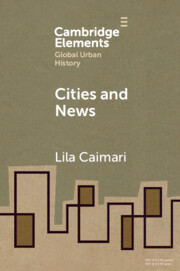Refine search
Actions for selected content:
2 results
Chapter 1 - Introduction
-
-
- Book:
- The Cambridge Companion to the City in World Literature
- Published online:
- 13 July 2023
- Print publication:
- 27 July 2023, pp 1-14
-
- Chapter
-
- You have access
- HTML
- Export citation

Cities and News
-
- Published online:
- 23 December 2021
- Print publication:
- 10 March 2022
-
- Element
- Export citation
